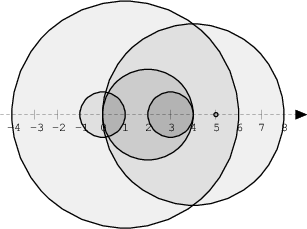NumberOfDiscIntersections (Lesson 6)
Instructions
We draw N discs on a plane. The discs are numbered from 0 to N − 1. An array A of N non-negative integers, specifying the radiuses of the discs, is given. The J-th disc is drawn with its center at (J, 0) and radius A[J].
We say that the J-th disc and K-th disc intersect if J ≠ K and the J-th and K-th discs have at least one common point (assuming that the discs contain their borders).
The figure below shows discs drawn for N = 6 and A as follows:
A[0] = 1
A[1] = 5
A[2] = 2
A[3] = 1
A[4] = 4
A[5] = 0

There are eleven (unordered) pairs of discs that intersect, namely:
- discs 1 and 4 intersect, and both intersect with all the other discs;
- disc 2 also intersects with discs 0 and 3.
Write a function:
function solution(A);
that, given an array A describing N discs as explained above, returns the number of (unordered) pairs of intersecting discs. The function should return −1 if the number of intersecting pairs exceeds 10,000,000.
Given array A shown above, the function should return 11, as explained above.
Write an efficient algorithm for the following assumptions:
- N is an integer within the range [0..100,000];
- each element of array A is an integer within the range [0..2,147,483,647].
Copyright 2009–2022 by Codility Limited. All Rights Reserved. Unauthorized copying, publication or disclosure prohibited.
Translate to Korean
N개의 배열에 각 디스크의 반지름 크기가 주어진다. Index가 원의 중심이 되고 해당 Index에 들어 있는 값이 반지름이 된다. ��원의 좌표가 다른 원 안에 포함하는 개수를 찾는다.
ex)
A[0] = 4
-> (-4,0), (0, 4)
Solution
function solution(A) {
const sortA = A.map((radius, idx) => {
return {
startPoint: idx - radius,
endPoint: idx + radius,
};
}).sort((a, b) => {
return a.startPoint - b.startPoint;
});
let answer = 0;
for (let i = 0, sortALength = sortA.length; i < sortALength; i++) {
const { startPoint, endPoint } = sortA[i];
for (let l = i + 1; l < sortALength; l++) {
if (answer > 10000000) {
return -1;
}
const { startPoint: targetStartPoint } = sortA[l];
if (targetStartPoint > endPoint) {
break;
}
if (startPoint <= targetStartPoint && targetStartPoint <= endPoint) {
answer += 1;
}
}
}
return answer;
}
Reviewㅇ
좀 코드가 길어서 헷갈리긴 했지만 차근차근 풀어나가면 풀 수 있다. 먼저 원들의 각 끝점들을 구하고 그 중복된 값을 구하지 않기 위해 정렬한다. 그 후에 해당 조건에 맞춰서 하나씩 점검하면 된다.